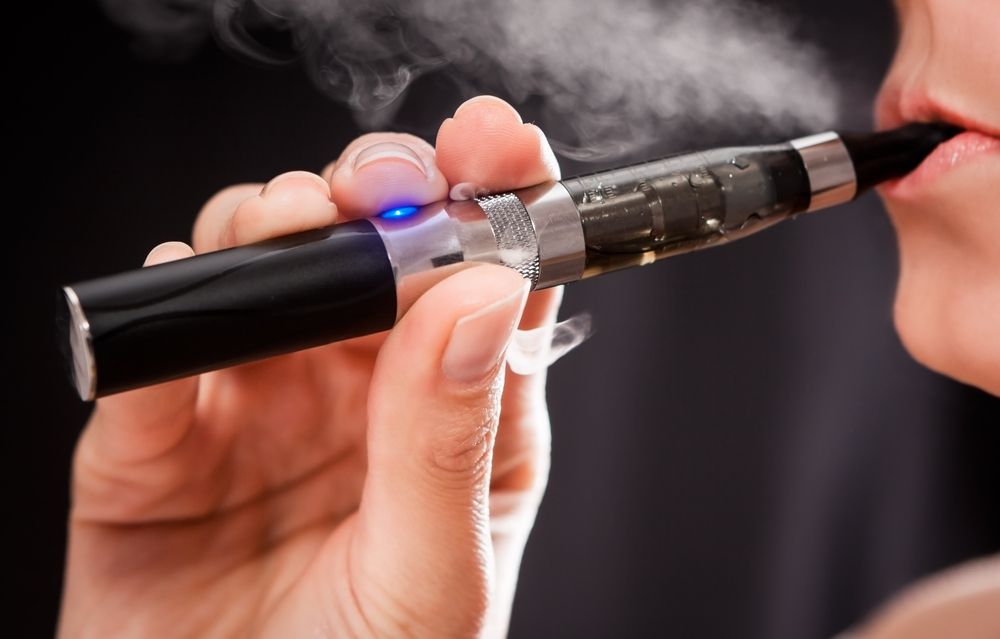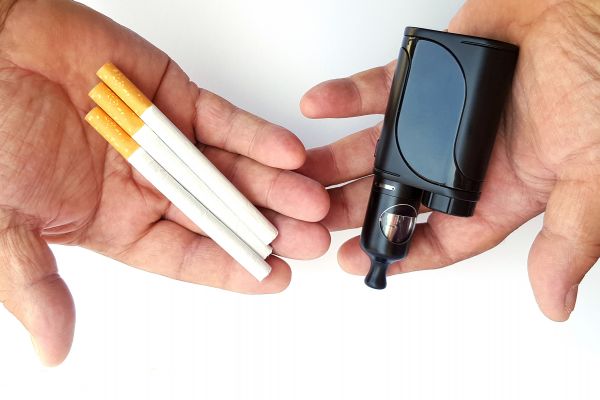In an effort to stop the tobacco industry from targeting younger generations, the U.S. government took aim at youth vaping early this year, banning some e-cigarette flavors — like mint and fruit flavors.
The government’s approach sought to allow continued use of e-cigarettes as an alternative to traditional cigarettes, while responding to concerns about growing addiction to a new product among teens, explains Health and Human Services Secretary Alex Azar. “By prioritizing enforcement against the products that are most widely used by children, our action seeks to strike the right public health balance,” Azar says.
Andrew Hyland, PhD, who heads a team of scientists that have contributed some of the most important early studies on e-cigarettes* and flavored tobacco in his role as Chair of Health Behavior at Roswell Park Comprehensive Cancer Center, says he hopes the ban will help stop the upward trend of vaping among teens. Flavored e-cigarettes are very popular: Studies show that e-cigarette users who start by using a flavored product are more likely to stay a user.
“In recent years, youth e-cigarette use has increased dramatically, and flavors are the top reason youth say they vape,” says Dr. Hyland. “This tells us that flavored products hook kids. With flavor names like ‘I Love Cookies’ and ‘OMG,’ it’s not hard to see why kids might try them.”
Limiting kid-friendly flavors is a good strategy for reducing the appeal of e-cigarettes. A study of students in Texas indicated that 93% of middle schoolers and 74% of high schoolers using flavored e-cigarettes said they would not continue if they were not flavored. (E-cigarette flavors are made up of chemicals like propylene glycol or glycerin, plus nicotine and flavorings.)
The federal ban applies to mint and fruit flavors that are offered in cartridge-based e-cigarettes, like the popular pods sold by Juul. The U.S. will continue to allow menthol and tobacco flavors, as well as fruit flavors delivered in other ways.
Never miss another Cancer Talk blog!
Sign up to receive our monthly Cancer Talk e-newsletter.
Sign up!Vaping has become more popular than traditional cigarettes among teens and young adults. In New York State, the number of high school students who vape quadrupled from 7.4% in 2014 to 27.4% in 2018. And while cigarette smoking is known to be extremely harmful — causing about 30% of all cancer deaths — vaping with e-cigarettes is not risk-free.
“E-cigarettes themselves are almost certainly less toxic than cigarettes, but they are not safe,” says Dr. Hyland. “E-cigarettes don’t burn tobacco, so there are far fewer toxins in their vapor than is found in cigarettes. But as a public health practitioner, saying something is less toxic than cigarettes leaves a lot to be desired.”
Research on the risks of vaping is just getting started. A conclusion of a recent National Academy of Science Report on e-cigarettes read “e-cigarettes cannot be simply categorized as either beneficial or harmful to health.” And a recent review in the British Medical Journal of the respiratory effects of e-cigarettes noted they have “measurable adverse biologic effects on organ and cellular health in humans. Evidence does show, however, that cancer patients who continue to smoke or vape during their treatment have less-positive clinical outcomes compared to those who quit before treatment.
Dr. Hyland acknowledges that some people believe vaping helps them quit smoking tobacco cigarettes, but he says there is not yet scientific consensus on whether this is an effective tool. “Getting people to stop smoking cigarettes is the most important thing we can do,” Dr. Hyland says. “When it comes to e-cigarettes, like any treatment with insufficient evidence we don’t endorse or discourage their use. Instead we focus on helping people taking the next step to try to quit cigarette smoking and increase the chance of staying off cigarettes long-term. There is no magic bullet, but resources like talking with your doctor, contacting the Quitline, and using stop-smoking medications can help as part of a plan to finally break the cigarette addiction.”
Patients who want to quit smoking may contact the New York State Smokers’ Quitline (1-866-NY-QUITS or 1-866-697-8487), a free and confidential service that provides effective stop-smoking services to New Yorkers.
Housed at Roswell Park, the Quitline has received over a million calls, and has helped thousands overcome their addiction to nicotine.
The Quitline offers:
- Telephone coaching in English and Spanish. (Translations through Language Line Services are available for other languages.)
- A starter kit of FREE nicotine replacement medications for eligible smokers.
- A “click to quit” online smoking cessation service.
*E-cigarettes are devices that use an electrically controlled heating element to vaporize a solution of nicotine and flavorants, which is then inhaled. They have been promoted as an alternative to traditional tobacco cigarettes for smokers.



